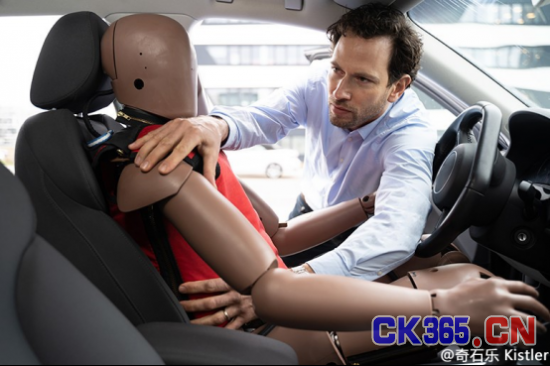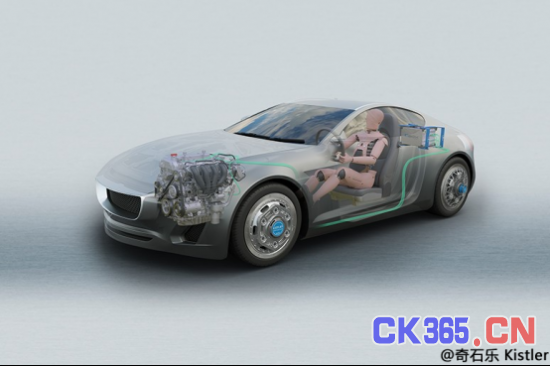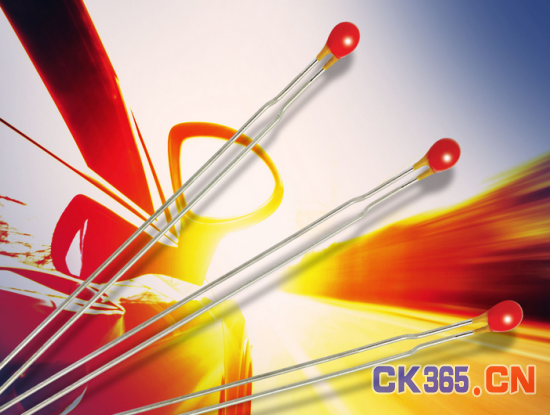Stunned pigs and self-experimentation with showers of glass splinters – life in the early days of vehicle occupant testing was certainly an adventure! But nowadays, all that has changed thanks to crash test dummies: high-tech models of human beings that provide critical input for modern vehicle safety. Inside these plastic research assistants, hundreds of sensors capture the accelerations and forces that occur during collisions. Kistler, the measurement technology specialist, is building the latest generation of frontal dummies that can even reproduce the facial injuries caused when a vehicle occupant is hurled into an airbag.
在早期的车辆碰撞的测试过程中,被敲晕的猪和真人志愿者作为测试中的主体,往往置身于玻璃碎片四处飞溅中,在这种条件下,实验测试者伴随着巨大的危险。如今,随着车辆碰撞测试假人的问世,这些高风险的测试已经发生了改变,高科技人体模型可为现代车辆的安全提供关键信息。在实验测试使用假人中,配备着上百个传感器,它们用于采集车辆碰撞中产生的加速度和力等传感器的信息。当汽车发生猛烈的碰撞时,安全气囊将会展开,作为专注于测试测量技术的企业,奇石乐正在研发新一代正面碰撞用假人就可以重现乘员撞入安全气囊时面部受到的伤害。
Until the middle of the 20th century, it was taken for granted that the human body was no match for the forces generated during car accidents. There was general acceptance that road accidents would inevitably cause deaths – and back then, there was no shortage of reasons for this assumption: hard, sharp-edged metal fittings and the general absence of safety belts, to name but two. Then in the early 1950s, this widely-held belief prompted researchers to carry out the first accident tests. They had no hesitation in strapping human corpses into cockpits to study typical injuries, both internal and external. These experiments were followed by tests where volunteers were exposed to emergency braking, or even showers of glass splinters. But the pain threshold was soon reached – quite literally! – so the engineers went on to place stunned pigs, bears or monkeys behind the wheel for the more brutal tests.
直到20世纪中期,人们还理所当然地认为,人体无法承受车辆碰撞产生的冲击力。当时的人们普遍相信,交通事故一定会造成死亡,这种想法在那个时代不无道理:那时的车辆使用坚硬、锐利的金属配件制成,且普遍未配备安全带。20世纪50年代初,在这种想法的推动下,研究人员开始了最初的车辆碰撞测试。他们将人类尸体放到驾驶舱,研究车辆碰撞对人体造成的典型内外伤。后来,志愿者自告奋勇,积极参与紧急制动等测试,甚至将自己置于四处飞溅的玻璃碎片之中。但是,人类显然难以承受车辆碰撞造成的痛苦,于是,工程师将敲晕的猪、熊或猴子放到驾驶室中,代替志愿者进行更残酷的测试。
Sensors to the rescue
传感器技术,碰撞测试的新时代救星
Humans and animals were eventually spared from these perils by the arrival of Sierra Sam, the world's first crash test dummy. Developed for the United States Air Force back in 1949, Sierra Sam was the prototype for subsequent dummy models that were put to use for road crash tests just a few years later. To replicate reality as closely as possible, dummies came in all shapes and sizes: male and female, short and tall, young and old. However, what really revolutionized crash testing was not so much the variety of versions that were available, but the integration of technology into the dummies.
终于,世界上首个车辆碰撞测试用假人Sierra Sam的诞生,使人类和动物都得以逃离碰撞测试带来的危险。Sierra Sam由美国空军于1949年发明,几年后被改装为车辆碰撞测试用假人。为尽可能模仿真人,Sierra Sam系列包括多种体型、身高、年龄的男性和女性假人。然而,真正为车辆碰撞测试带来革命性突破的并非体型、身高各异的假人,而是集成技术在假人中的应用。
This trend began in the early 1970s when the Hybrid I to III series of models from General Motors were fitted with the first sensors to measure force and acceleration in their heads, torsos and thighs. As technology improved, engineers equipped the models with additional sensors in parts of the body where injuries could prove fatal, such as the neck or the spinal column. Angular rate sensors also made it possible to measure bending of the limbs due to a collision.
20世纪70年代初,通用汽车发明了Hybrid I、II和III系列假人,率先在假人头部、躯干和大腿处安装测量力和加速度的传感器。随着科技发展,工程师在可能遭受致命伤害的其他人体部位也安装了传感器,例如颈部和脊椎。他们还使用角速度传感器测量假人四肢在车辆碰撞中的弯曲情况。
Dummies get smart
假人智能化
For many years, the Hybrid III was regarded as the universal standard in the industry – until THOR pushed it out of the driver's seat. THOR – the Test Device for Human Occupant Restraint – differs from its predecessor in many ways: with the help of extra facial sensors, for example, it achieves better resolution of the distributed forces that are generated when an occupant is flung into an airbag. THOR represents an average adult male, weighing in at 77 kilograms and with a height of 1.76 meters.
多年来,Hybrid III假人始终被视为行业通用标准——直到THOR假人取而代之,在车辆碰撞测试中成为乘员中主驾位置。与Hybrid III相比,THOR(人体乘员约束测试装置)假人具有多种优势,例如,它集成面部传感器,可以更清晰地体现乘员撞入安全气囊时面部受力的分布情况。THOR假人对标的人体模型为平均体重为77公斤、身高1.76米的成年男性。
To prepare this latest-generation crash dummy for real use, the measurement experts at Kistler equipped it with data acquisition caPACity for up to 288 measuring channels. Data is speedily exported from the wreck via one single Ethernet cable in the dummy's thorax. By contrast, THOR's forerunners with their tangle of wires looked more like puppets on many strings. Since 2018, Kistler has carried out the complete production process for THOR dummies at its Heidelberg site.
为将新一代碰撞测试用假人投入实际应用,奇石乐的测量专家为其装配了多达288个测量通道的数据采集系统。仅需通过假人胸腔内的一根以太网线缆,就可以快速导出车辆碰撞后假人的测量数据。相比之下,THOR的“前辈”们身上缠绕着各种电线,仿佛一个个牵线木偶。2018年以来,奇石乐已在海德堡工厂完成了THOR假人的完整生产工艺。
Despite this impressive progress, dummy development has certainly not reached the end of the road yet: these "accident dolls" will become even smarter as time goes on, and further improvements such as more realistic replication of injuries to internal organs will become possible. Long ago, people believed that a car accident meant certain death – but thanks to crash dummies, that era is now well and truly over.
尽管取得了如此巨大的进步,车辆碰撞测试用假人的开发依然任重道远。展望未来,假人将得到进一步优化,变得更加智能,例如,能够更真实地复现人体内脏器官在车辆碰撞中受到的伤害。很久以前,人们认为交通事故一定会造成死亡——如今,得益于车辆碰撞测试用假人,那个时代已经一去不复返了。

Kistler offers high-precision sensor technology and integrated data acquisition solutions for dummies of every type – and now, the portfolio also includes a proprietary THOR dummy that features flexible instrumentation.
奇石乐提供高精准传感器和不同类型假人内置数采集成解决方案,现在,奇石乐自主研发的THOR假人系统已面世,它可灵活配置假人的通道信息。

THOR represents an average adult male, weighing in at 77 kilograms and with a height of 1.76 meters.
THOR假人对标的人体模型为平均体重77公斤、身高1.76米的成年男性。

Just one single cable in the dummy's thorax is needed to configure the sensors, transmit and synchronize the measurement data, and supply power – for as many as 288 channels.
仅需通过假人胸腔中的一根线缆(多达288个测量通道),即可完成传感器配置以及测量数据的传输和同步,并满足假人供电需求。







